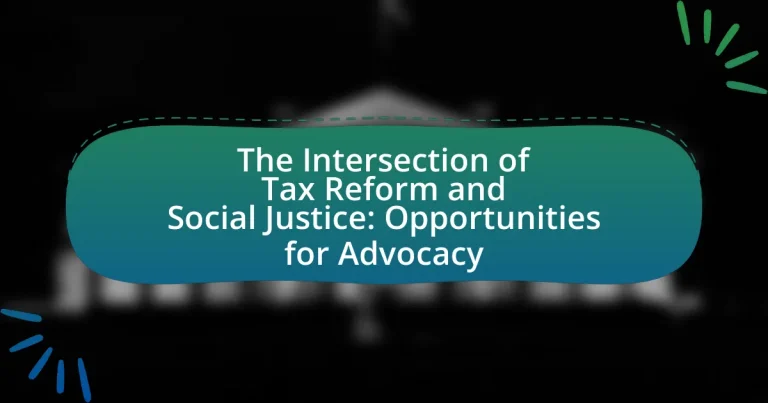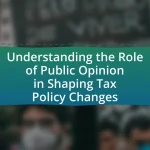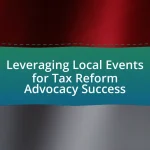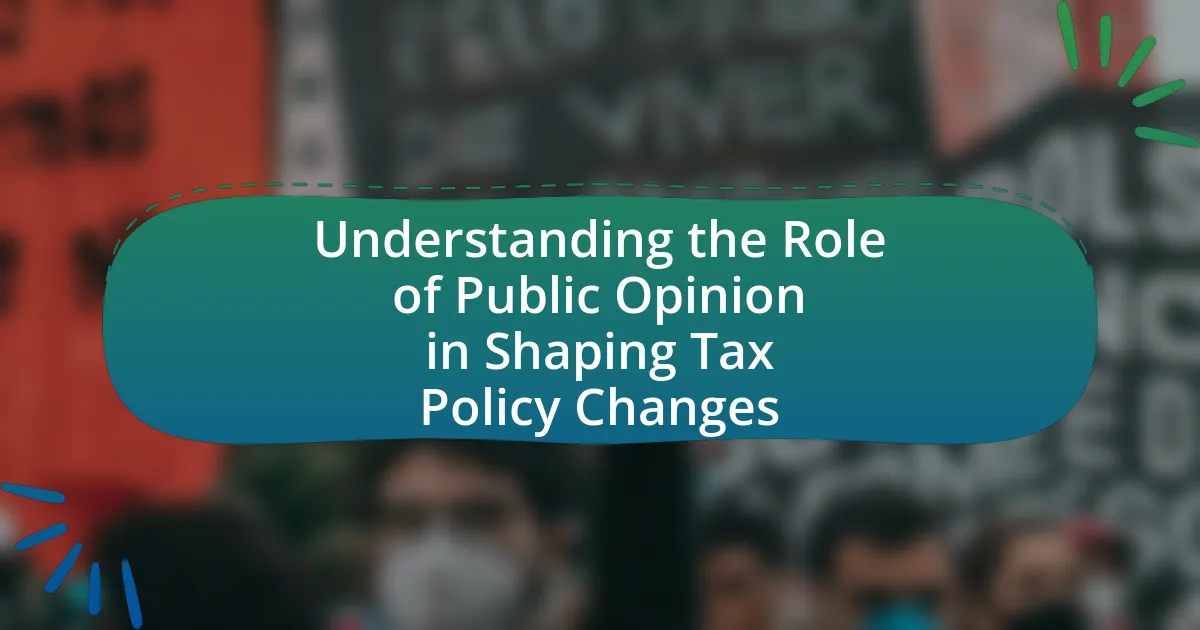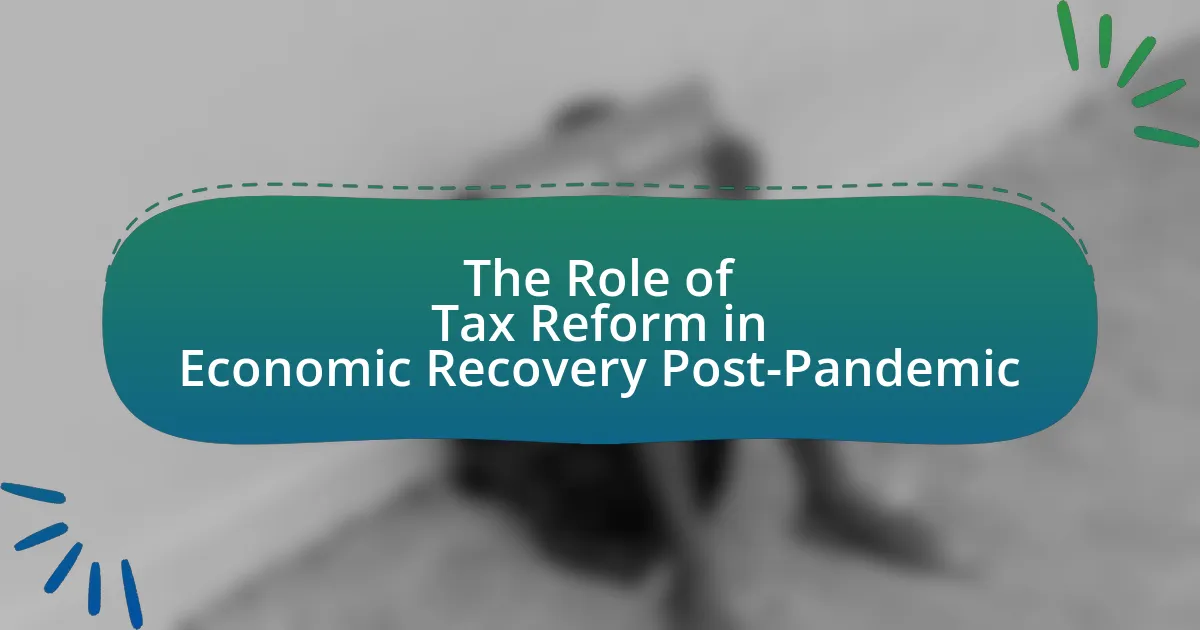The article examines the intersection of tax reform and social justice, highlighting how tax policies can address economic inequalities and promote equitable resource distribution. It discusses the impact of progressive and regressive tax systems on marginalized communities, emphasizing the principles of equity, fairness, and accountability in taxation. The article also explores current trends in tax reform, recent proposals aimed at enhancing social equity, and the challenges advocates face in promoting these reforms. Additionally, it outlines strategies for effective advocacy, the role of education, and resources available for individuals and organizations engaged in this critical issue.
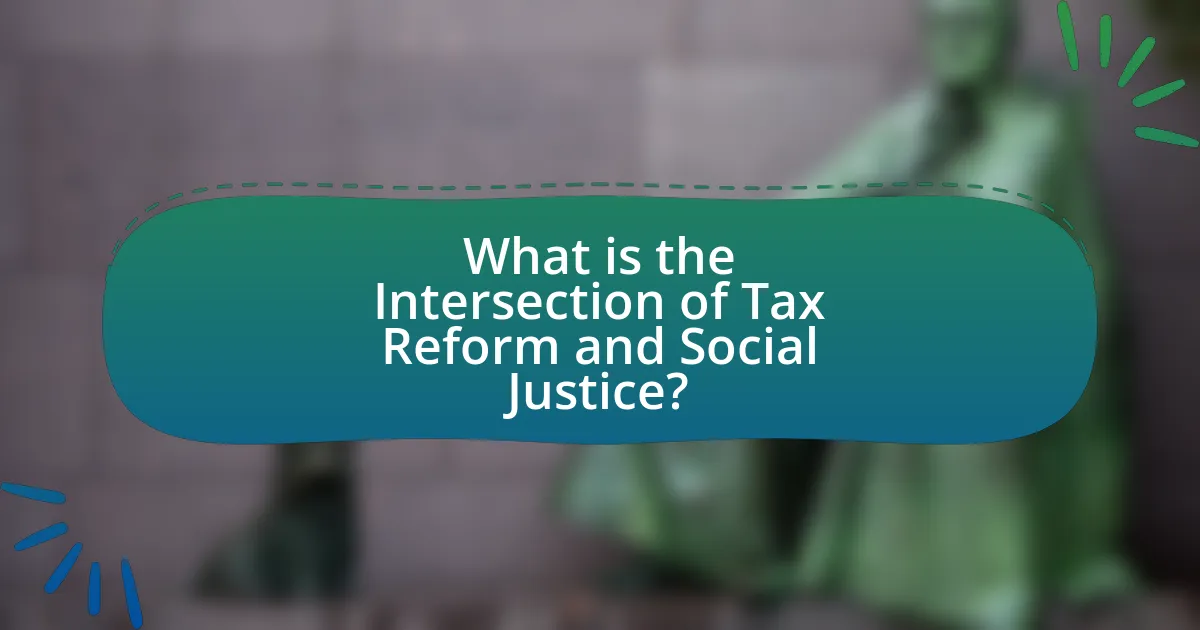
What is the Intersection of Tax Reform and Social Justice?
The intersection of tax reform and social justice lies in the way tax policies can address economic inequalities and promote equitable resource distribution. Tax reform can create a more progressive tax system that reduces the burden on low-income individuals while ensuring that wealthier individuals contribute a fair share, thereby fostering social equity. For instance, studies have shown that progressive taxation can lead to reduced income inequality; the OECD reported that countries with more progressive tax systems tend to have lower levels of income disparity. This relationship highlights the potential for tax reform to serve as a tool for advancing social justice by redistributing wealth and funding essential public services that benefit marginalized communities.
How do tax reforms impact social justice initiatives?
Tax reforms significantly impact social justice initiatives by altering the distribution of resources and funding for social programs. For instance, progressive tax reforms, which increase tax rates on higher income brackets, can generate additional revenue that supports social justice initiatives such as education, healthcare, and housing assistance. According to a report by the Institute on Taxation and Economic Policy, states that implemented progressive tax reforms saw a reduction in income inequality and increased funding for public services that benefit marginalized communities. Conversely, regressive tax reforms, which disproportionately burden low-income individuals, can undermine social justice efforts by reducing available resources for essential services. Thus, the structure of tax reforms directly influences the effectiveness and reach of social justice initiatives.
What are the key principles of social justice in relation to taxation?
The key principles of social justice in relation to taxation include equity, fairness, and accountability. Equity demands that individuals contribute to tax systems based on their ability to pay, ensuring that wealthier individuals and corporations bear a larger share of the tax burden. Fairness emphasizes the need for tax policies that do not disproportionately affect marginalized communities, promoting a more just distribution of resources. Accountability requires transparency in how tax revenues are utilized, ensuring that funds are directed towards public services that benefit all citizens, particularly those in need. These principles are supported by studies indicating that progressive tax systems can reduce income inequality and enhance social welfare.
How do different tax systems affect marginalized communities?
Different tax systems significantly impact marginalized communities by either exacerbating or alleviating economic inequalities. Progressive tax systems, which impose higher rates on wealthier individuals, can provide essential funding for social services that benefit low-income populations, such as education and healthcare. For instance, research from the Institute on Taxation and Economic Policy indicates that states with more progressive tax structures tend to have lower poverty rates and better access to public services for marginalized groups. Conversely, regressive tax systems, which disproportionately burden lower-income individuals through sales taxes or flat income taxes, can deepen financial strain on these communities, leading to increased economic hardship and limited access to resources. A study by the Center on Budget and Policy Priorities found that regressive tax policies can result in a significant loss of income for low-income families, further entrenching cycles of poverty.
Why is tax reform a critical issue for social equity?
Tax reform is a critical issue for social equity because it directly influences the distribution of wealth and resources within society. Effective tax reform can reduce income inequality by ensuring that wealthier individuals and corporations contribute a fair share, thereby funding essential public services that benefit lower-income communities. For instance, the Tax Policy Center reported that in 2021, the top 1% of earners received 20% of all income but paid only 27% of federal income taxes, highlighting a disparity that tax reform could address. By restructuring tax policies to be more progressive, governments can enhance social equity, providing greater access to education, healthcare, and social services for marginalized populations.
What historical contexts have shaped the current tax reform debates?
The current tax reform debates have been shaped by several historical contexts, including the Progressive Era reforms of the early 20th century, the New Deal policies of the 1930s, and the tax cuts of the Reagan administration in the 1980s. The Progressive Era introduced income taxes aimed at reducing economic inequality, while the New Deal expanded government intervention in the economy and established social safety nets, influencing modern tax policy discussions. Additionally, the Reagan administration’s tax cuts emphasized supply-side economics, which has led to ongoing debates about the balance between tax relief and revenue generation. These historical contexts provide a framework for understanding contemporary discussions on tax reform, particularly in relation to social justice and equity.
How do tax policies perpetuate or alleviate inequality?
Tax policies can perpetuate inequality by favoring wealth accumulation among the affluent while imposing a heavier burden on lower-income individuals. For instance, regressive tax structures, such as sales taxes, disproportionately affect those with lower incomes, as they pay a larger percentage of their earnings compared to wealthier individuals. Conversely, progressive tax systems, where higher income earners pay a larger percentage, can alleviate inequality by redistributing wealth through social programs funded by these taxes. Historical data shows that countries with progressive tax systems, like Sweden, have lower income inequality levels, as evidenced by the Gini coefficient, which measures income distribution. Thus, the design and implementation of tax policies play a crucial role in either exacerbating or mitigating economic disparities.
What opportunities exist for advocacy at this intersection?
Opportunities for advocacy at the intersection of tax reform and social justice include promoting equitable tax policies that reduce income inequality and support marginalized communities. Advocates can push for progressive taxation, which ensures that higher earners contribute a fairer share, thereby funding social programs that benefit low-income individuals. Research from the Institute on Taxation and Economic Policy indicates that states with progressive tax systems have lower poverty rates, demonstrating the effectiveness of such policies in promoting social equity. Additionally, advocacy can focus on closing tax loopholes that disproportionately benefit wealthy individuals and corporations, thereby reallocating resources to support social justice initiatives.
How can grassroots movements influence tax reform policies?
Grassroots movements can influence tax reform policies by mobilizing public support and advocating for specific changes that reflect community needs. These movements often raise awareness about tax inequities, such as the disproportionate burden on low-income individuals, and can effectively organize campaigns that pressure lawmakers to consider reforms. For instance, the Fight for $15 movement has successfully advocated for higher minimum wages, which indirectly impacts tax policies by increasing the income levels of workers and altering tax revenue dynamics. Additionally, grassroots organizations can leverage social media to amplify their messages, gather signatures for petitions, and engage in lobbying efforts, thereby creating a significant impact on legislative agendas. Historical examples, such as the Tea Party movement in the United States, demonstrate how organized grassroots efforts can shift political discourse and lead to substantial tax policy changes.
What role do policymakers play in promoting social justice through tax reform?
Policymakers play a crucial role in promoting social justice through tax reform by designing and implementing tax policies that aim to reduce inequality and support marginalized communities. They can achieve this by creating progressive tax systems where higher income earners pay a larger percentage of their income in taxes, thereby redistributing wealth to fund social programs that benefit lower-income individuals. For instance, the Tax Cuts and Jobs Act of 2017 in the United States disproportionately benefited wealthier individuals, highlighting the impact of policymakers’ choices on social equity. Additionally, policymakers can advocate for tax credits and deductions that specifically assist low-income families, such as the Earned Income Tax Credit, which has been shown to lift millions out of poverty. By prioritizing equitable tax policies, policymakers can directly influence the distribution of resources and opportunities, thereby advancing social justice.
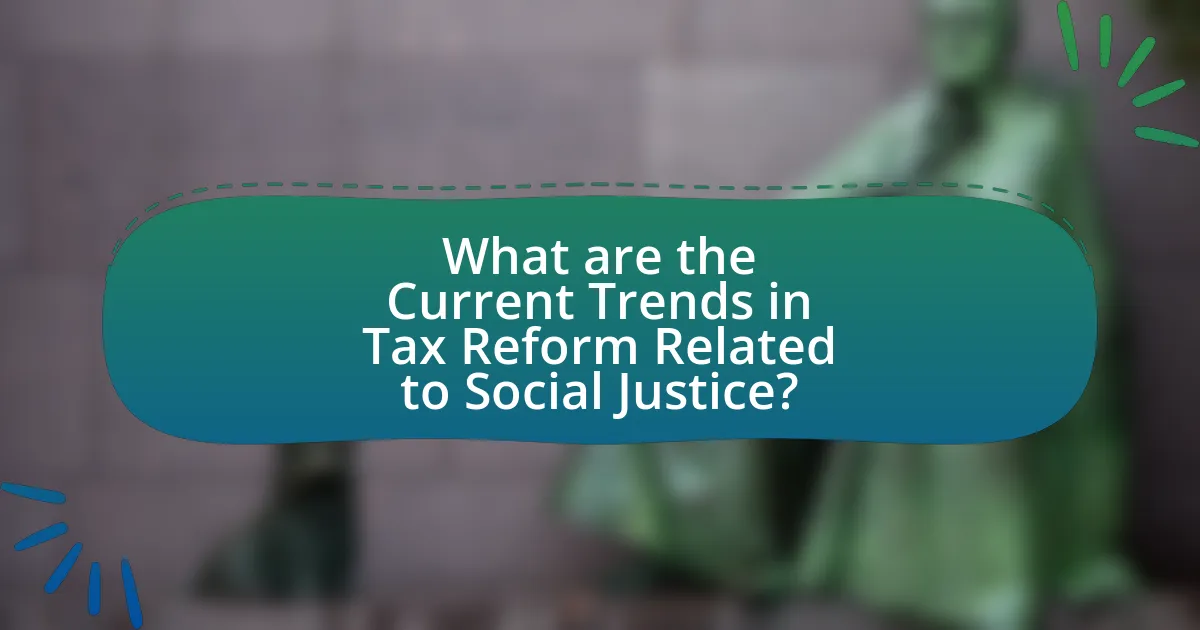
What are the Current Trends in Tax Reform Related to Social Justice?
Current trends in tax reform related to social justice focus on progressive taxation, wealth redistribution, and closing tax loopholes that disproportionately benefit the wealthy. Progressive taxation aims to increase tax rates for higher income brackets, thereby reducing income inequality; for instance, proposals in various states suggest increasing taxes on the top 1% to fund social programs. Wealth redistribution initiatives, such as universal basic income and expanded child tax credits, seek to provide financial support to lower-income families, enhancing their economic stability. Additionally, efforts to close tax loopholes, such as those exploited by large corporations and high-net-worth individuals, are gaining traction, as evidenced by the Biden administration’s push for a minimum corporate tax rate to ensure that all entities contribute fairly to public finances. These trends reflect a growing recognition of the need for tax systems that promote equity and support marginalized communities.
How are recent tax reforms addressing social justice issues?
Recent tax reforms are addressing social justice issues by implementing progressive tax structures that aim to reduce income inequality. These reforms often include increased tax rates for higher income brackets, which are designed to redistribute wealth more equitably across society. For example, the Tax Cuts and Jobs Act of 2017 included provisions that disproportionately benefited wealthier individuals, prompting subsequent reforms aimed at increasing taxes on the wealthy to fund social programs. Additionally, many states have introduced or expanded earned income tax credits, which directly support low-income families, thereby promoting economic equity. These measures are supported by research indicating that progressive taxation can lead to improved social outcomes, such as reduced poverty rates and increased access to education and healthcare.
What specific reforms have been proposed or implemented recently?
Recent reforms proposed in the context of tax reform and social justice include the implementation of progressive tax rates aimed at higher income brackets, which seek to reduce income inequality. For instance, several states have introduced legislation to increase taxes on the wealthiest individuals, with the goal of funding social programs that benefit low-income communities. Additionally, proposals for closing tax loopholes that disproportionately benefit corporations and the wealthy have gained traction, aiming to ensure a fairer tax system. These reforms are supported by data indicating that progressive taxation can lead to improved social equity and funding for essential public services.
How do these reforms align with social justice goals?
These reforms align with social justice goals by promoting equitable tax policies that reduce income inequality and provide essential services to marginalized communities. For instance, progressive tax structures, which impose higher rates on wealthier individuals, can redistribute resources to fund public programs such as education and healthcare, directly benefiting low-income populations. Research from the Institute on Taxation and Economic Policy indicates that states with progressive tax systems have lower poverty rates, demonstrating a clear link between tax reform and improved social equity.
What challenges do advocates face in promoting tax reform?
Advocates face significant challenges in promoting tax reform, primarily due to political resistance and public misunderstanding. Political resistance often stems from entrenched interests that benefit from the current tax system, making it difficult to garner support for changes. Additionally, public misunderstanding of tax reform proposals can lead to fear and opposition, as many individuals may not fully grasp the implications of proposed changes on their personal finances. For instance, a 2021 survey by the Pew Research Center indicated that only 39% of Americans felt they understood the tax code well, highlighting the communication gap advocates must bridge to effectively promote reform.
What are the common misconceptions about tax reform and social justice?
Common misconceptions about tax reform and social justice include the belief that tax reform solely benefits the wealthy and that it does not address systemic inequalities. Many people assume that tax cuts for high-income earners lead to economic growth that benefits everyone, ignoring evidence that such policies often exacerbate wealth disparities. Additionally, there is a misconception that tax reform cannot be designed to promote social equity; however, progressive tax systems, which impose higher rates on the wealthy, have been shown to reduce income inequality and fund essential social services. Studies indicate that equitable tax policies can enhance social justice by redistributing wealth and providing resources for marginalized communities.
How can advocates overcome resistance to tax reform initiatives?
Advocates can overcome resistance to tax reform initiatives by employing strategic communication and building coalitions. Effective communication involves clearly articulating the benefits of tax reform, such as increased equity and funding for social programs, which can resonate with diverse stakeholders. Research shows that framing tax reform in terms of social justice can mobilize support; for instance, a study by the Institute on Taxation and Economic Policy highlights that equitable tax policies can reduce income inequality. Additionally, forming coalitions with community organizations and stakeholders can amplify voices and create a united front, making it harder for opponents to dismiss reform efforts. By leveraging data and personal stories, advocates can address misconceptions and foster a more informed public dialogue around tax reform.
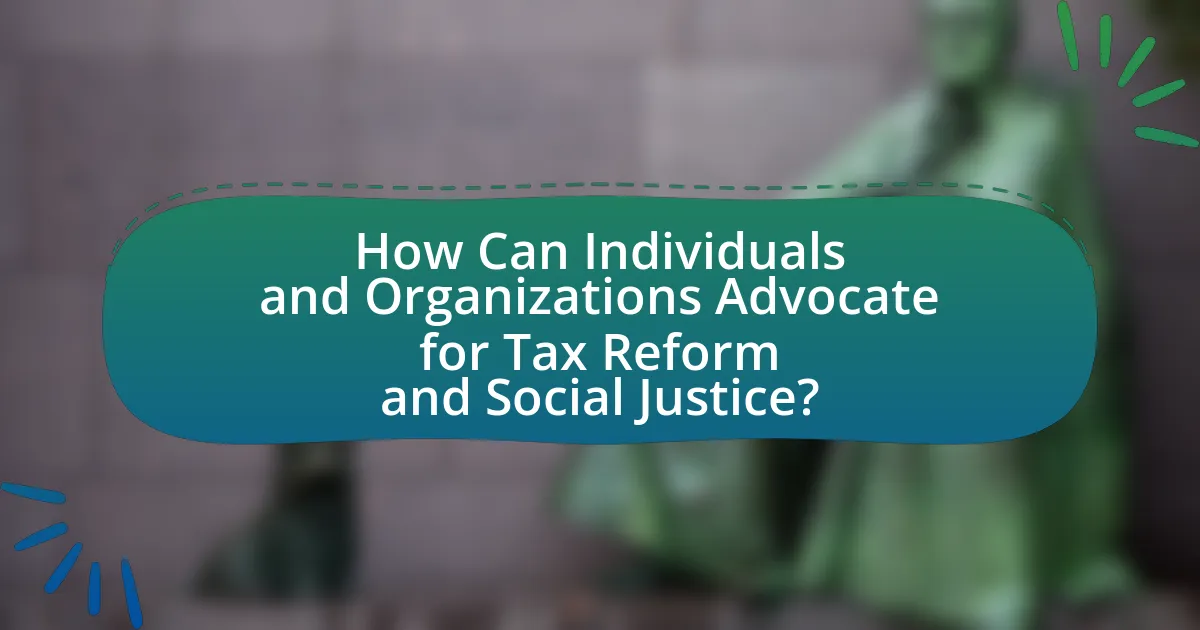
How Can Individuals and Organizations Advocate for Tax Reform and Social Justice?
Individuals and organizations can advocate for tax reform and social justice by engaging in grassroots mobilization, policy advocacy, and public education campaigns. Grassroots mobilization involves organizing community members to raise awareness about tax policies that disproportionately affect marginalized groups, thereby fostering collective action. Policy advocacy includes lobbying lawmakers to support equitable tax legislation, such as progressive tax systems that reduce income inequality. Public education campaigns can inform citizens about the importance of tax reform in achieving social justice, utilizing data that shows how tax policies impact wealth distribution and access to essential services. For instance, studies have demonstrated that progressive tax systems can significantly reduce poverty rates and improve access to education and healthcare, highlighting the direct link between tax reform and social equity.
What strategies can be employed for effective advocacy?
Effective advocacy can be achieved through strategies such as building coalitions, utilizing data-driven arguments, and engaging in grassroots mobilization. Building coalitions allows diverse groups to unite around common goals, enhancing influence and reach. Data-driven arguments provide credible evidence to support claims, making advocacy efforts more persuasive; for instance, studies show that policies backed by solid data are more likely to gain public and legislative support. Grassroots mobilization engages community members directly, fostering a sense of ownership and urgency, which can lead to increased participation and pressure on decision-makers.
How can community engagement enhance advocacy efforts?
Community engagement enhances advocacy efforts by fostering stronger relationships between advocates and the communities they serve, leading to more effective and targeted initiatives. Engaged communities provide valuable insights into their specific needs and challenges, which allows advocates to tailor their messages and strategies accordingly. For instance, research from the National Civic League indicates that communities involved in advocacy efforts are 50% more likely to see successful policy changes, as they mobilize local support and resources effectively. This collaboration not only amplifies the voices of marginalized groups but also increases the legitimacy and impact of advocacy campaigns, ultimately driving meaningful social change.
What role does education play in advocating for tax reform?
Education plays a crucial role in advocating for tax reform by equipping individuals with the knowledge and skills necessary to understand complex tax systems and their implications on social justice. Through educational initiatives, individuals can learn about the disparities created by current tax policies, fostering informed discussions and mobilizing communities for change. Research indicates that educated citizens are more likely to engage in advocacy efforts, as they can critically analyze tax structures and articulate the need for reforms that promote equity. For instance, studies show that states with higher levels of educational attainment tend to have more progressive tax policies, highlighting the correlation between education and effective advocacy for tax reform.
What resources are available for advocates?
Advocates have access to various resources, including research reports, toolkits, training programs, and funding opportunities. Research reports from organizations like the Center on Budget and Policy Priorities provide data and analysis on tax reform impacts, while toolkits from groups such as the National Women’s Law Center offer practical guidance for advocacy efforts. Training programs, often provided by advocacy networks, equip advocates with skills in policy analysis and community organizing. Additionally, funding opportunities from foundations focused on social justice support initiatives aimed at influencing tax policy. These resources collectively empower advocates to effectively engage in the intersection of tax reform and social justice.
Which organizations focus on tax reform and social justice advocacy?
Organizations that focus on tax reform and social justice advocacy include the Institute on Taxation and Economic Policy (ITEP), the Center on Budget and Policy Priorities (CBPP), and the National Women’s Law Center (NWLC). ITEP conducts research and analysis on tax policies, advocating for equitable tax systems that benefit low- and middle-income families. CBPP focuses on federal and state budget policies, emphasizing the importance of tax reform in reducing poverty and inequality. NWLC advocates for policies that support women’s economic security, including fair tax policies that address gender disparities. These organizations provide data-driven insights and policy recommendations to promote social justice through tax reform.
How can individuals get involved in advocacy efforts?
Individuals can get involved in advocacy efforts by participating in community organizations focused on social justice and tax reform. Engaging with local advocacy groups allows individuals to contribute to campaigns, attend meetings, and mobilize support for policy changes. According to a report by the National Council of Nonprofits, grassroots advocacy has proven effective in influencing legislation, demonstrating that collective action can lead to significant reforms. Additionally, individuals can utilize social media platforms to raise awareness and share information about advocacy initiatives, amplifying their impact.
What are the best practices for advocating at the intersection of tax reform and social justice?
The best practices for advocating at the intersection of tax reform and social justice include building coalitions, utilizing data-driven arguments, and engaging in grassroots mobilization. Building coalitions with diverse stakeholders, such as community organizations, labor unions, and advocacy groups, enhances the collective voice and influence in policy discussions. Utilizing data-driven arguments, such as statistics showing the disproportionate impact of tax policies on marginalized communities, strengthens the case for reform. Engaging in grassroots mobilization ensures that affected communities are involved in the advocacy process, amplifying their voices and experiences. These practices are supported by research indicating that collaborative efforts and community engagement lead to more effective advocacy outcomes in social justice initiatives.
